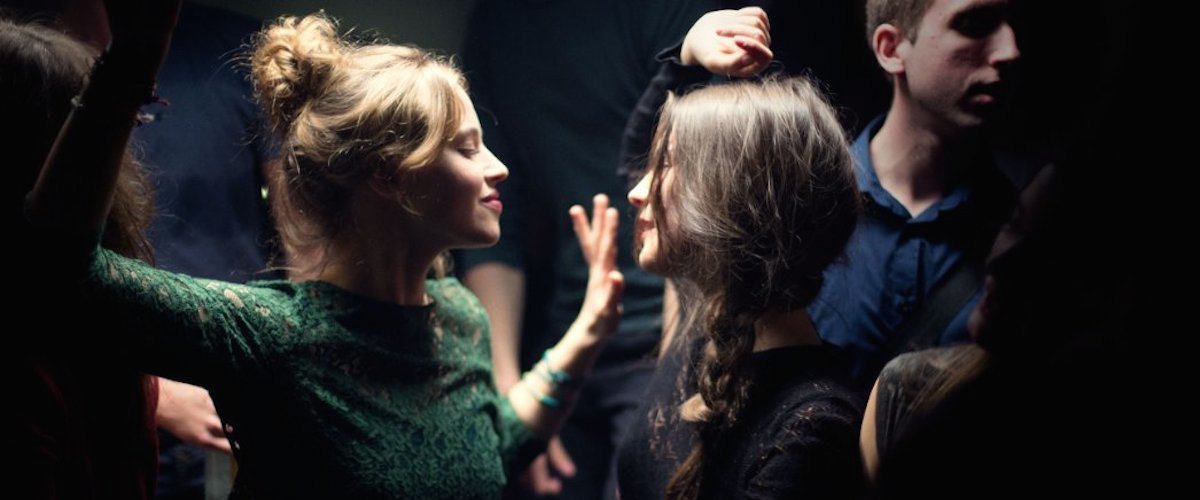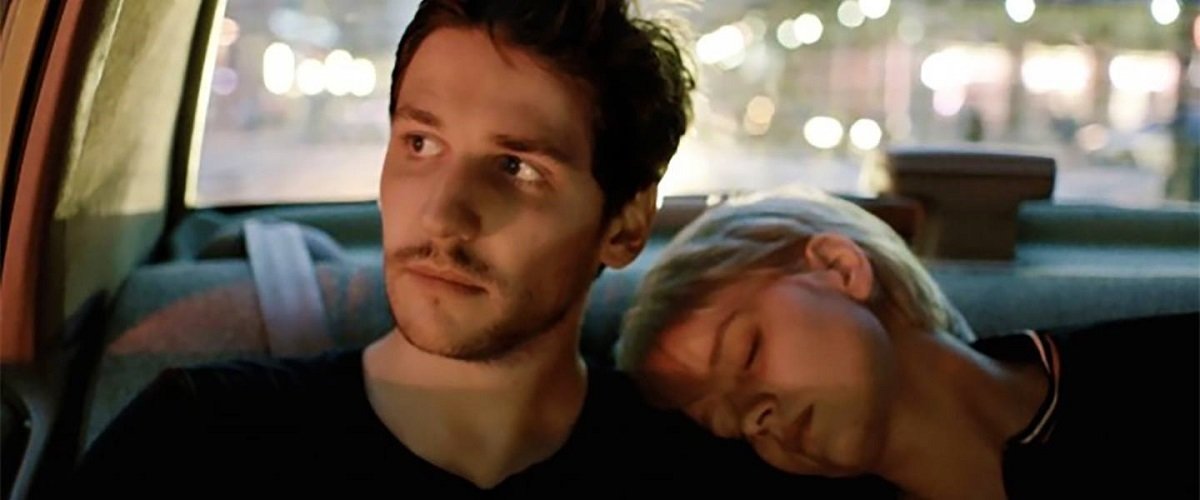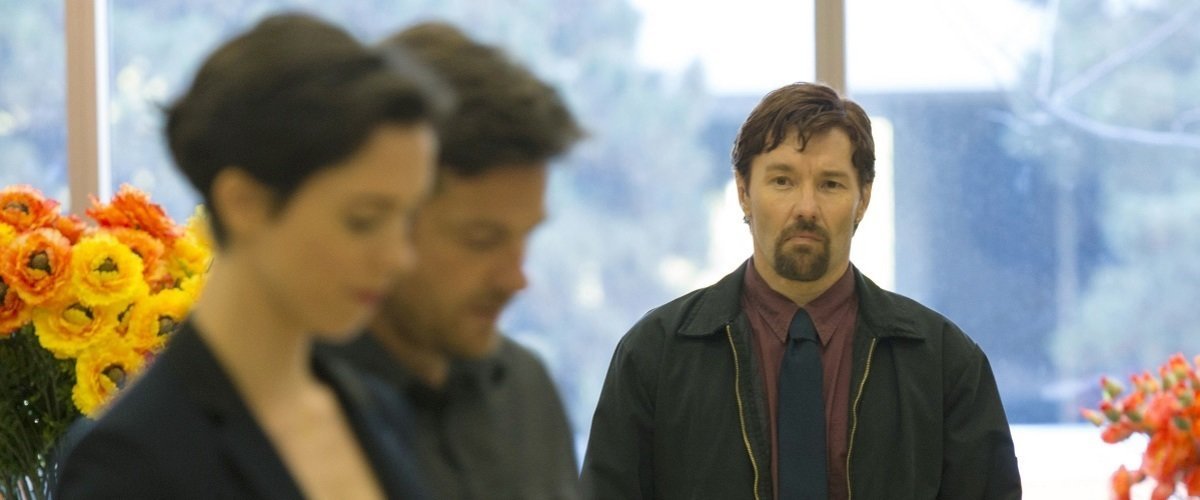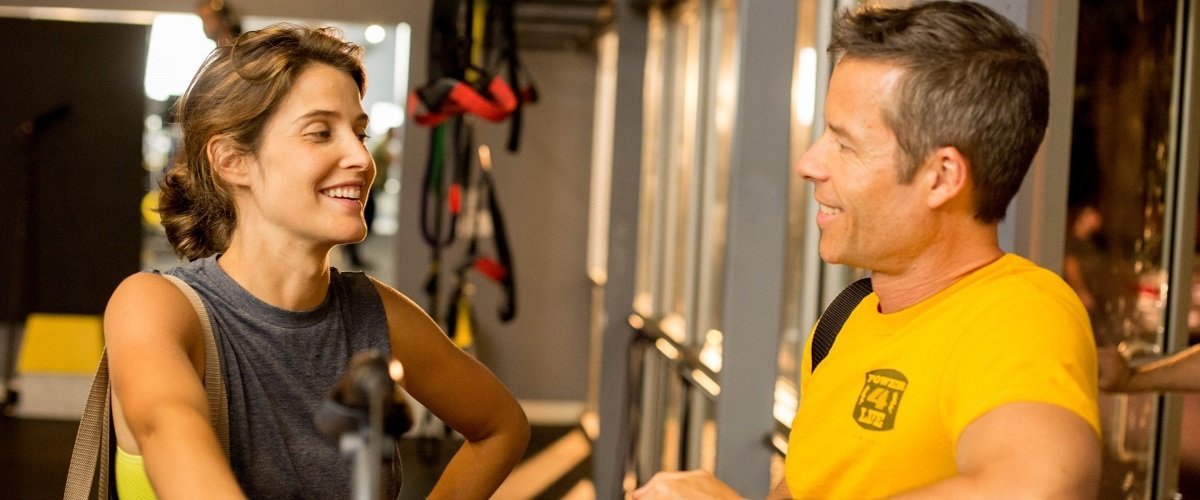
This series features the movie questionnaires and reviews from 2015 published by our site's regular film critics. We continue with critic Sheila O'Malley, who has reviewed such films as "Dreamcatcher," "Eden," "Girlhood" and "I Am Big Bird: The Caroll Spinney Story." Her Twitter handle is @sheilakathleen.
QUESTIONNAIRE:
Where did you grow up, and what was it like?
I grew up in Rhode Island, surrounded by turf farms on one side and ocean on the other. Rhode Island is a beautiful state.
Do you do any other jobs besides this one, and if so, what if anything did doing those jobs contribute to your sensibility as a moviegoer?
I do web production on a freelance basis. It helps pay the bills, not much else. I started out as an actress, so acting has always been my "way in" to movies. I am drawn to performance, above all else, and can forgive much if the acting is good.
Was anyone else in your family into movies? If so, what effect did they have on your moviegoing tastes?
My whole family is into movies. My parents let me and my brother stay up late on a school night when we were kids only twice, once to see "The Sting" and once to see "What's Up, Doc?" They both remain favorites. I also have a vivid memory of watching "Sounder" on television with my parents, and looking over at my mother during that phenomenal last scene, and seeing my mother crying. It made a huge impression on me. I felt, in my childish soul, that that was a very emotional scene, and seeing my mother crying confirmed it for me.
What's the first movie you remember seeing, and what impression did it make on you?
Probably some Disney movie, although I can't remember. Seeing "Oliver!" when I was 9 or 10 launched an obsession that was all-consuming. I loved movies about orphans, scrappy kids living by their wits.

What's the first movie that made you think, "Hey, some people made this. It didn't just exist. There's a human personality behind it."
"East of Eden." I was twelve. It blew my mind, mostly because of James Dean's performance (which I found revelatory at the time). In researching James Dean (I took out "The Mutant King" from our local library), I came across the name "Elia Kazan". I had to know more about him, who this man was who created those scenes that made such an impression. It was "East of Eden" that led me to seek out more works by Elia Kazan, and although much of it went way over my head, he was the first director I took an interest in.
What's the first movie you ever walked out of?
None that I can recall.
What's the funniest film you've ever seen?
"What's Up, Doc?" is up there, although "His Girl Friday", "My Man Godfrey", and "Bringing Up Baby" have got to be on the list. I also think "Manhattan Murder Mystery" is hilarious.
What's the saddest film you've ever seen?
"The Heiress" is devastating. Ralph Richardson's protection of his daughter is well-meaning (and also correct: Montgomery Clift IS a fortune hunter), but the scene where Olivia de Havilland realizes that her father has contempt for her is still painful for me to watch, even after so many viewings.
What's the scariest film you've ever seen?
"The Exorcist" ruined my childhood.
What's the most romantic film you've ever seen?
Cocteau's "Beauty and the Beast." Nancy Savoca's "Dogfight."
What's the first television show you ever saw that made you think television could be more than entertainment?
This pre-dates my own memory, but I'm sure it was "Sesame Street." There's a picture of me sitting in my little rocking chair watching "Sesame Street," and I am lost to the world. That wasn't entertainment, it was enchantment.
What book do you think about or revisit the most?
It's a toss-up between "Catch 22" by Joseph Heller, "Franny and Zooey" by J.D. Salinger and "Hopeful Monsters" by Nicholas Mosley. Those books express the questions (and not the answers) that I find most interesting and urgent.
What album or recording artist have you listened to the most, and why?
At the present moment, Elvis Presley. I like all the different Elvises: the jumpsuit Elvis, the raw Sun Records Elvis, the sleek smooth RCA Elvis, the gospel Elvis, the country Elvis. I love the movie Elvis, too. One of the simplest things I can say about him is that if I'm having a stressed-out day where I feel overwhelmed, or caught up with the small stuff, if one of his songs comes up on iPod shuffle, his voice re-arranges that stress a little bit, giving me a sense of space, peace.

Is there a movie that you think is great, or powerful, or perfect, but that you never especially want to see again, and why?
"Mr. and Mrs. Bridge." I found it unbearably sad, so much so that I almost blocked it out as I was watching it. The acting was so superb, unblinkingly so. I still think of that final moment from time to time. It haunts me. But I don't need to put myself through that again.
What movie have you seen more times than any other?
It is either "Only Angels Have Wings" or "G.I. Jane," which makes no sense, but I have to be honest. "Only Angels Have Wings" is one of those magical movies that works—the way good show business works—every single time. Every single time I get caught up in that world, those guys, that bar, the airfield, the mountain pass, the drinking. And "G.I. Jane." What can I say. I won't make a case for it being a great film, but I think it's a lot of fun, with some surprisingly effective performances (from Anne Bancroft and Viggo Mortensen in particular).
What was your first R-rated movie, and did you like it?
"Dog Day Afternoon," which I saw on late-night television while I was babysitting, age 12. I could feel at the time that it was too grown-up for me to be watching and much of it (like the sex change) went over my head. But I can say without too much exaggeration that that film changed how I looked at life, and certainly changed how I looked at the art of movies and acting. I was so rocked by the film that I actually considered writing a letter to the real "Sonny," in prison. I remember the father of the kid I was babysitting driving me home that night, and I was already plotting and scheming in my head how I could find out what prison "Sonny" was in so I could write him a letter of support. That's how much that film got under my skin. I've never forgotten what it was like to see it for the first time.
What's the most visually beautiful film you've ever seen?
Probably Terrence Malick's "Days of Heaven." "Beauty and the Beast," again. Lots of John Ford. "The Master" is so beautiful it sometimes hurts my eyes.
Who are your favorite leading men, past and present?
Cary Grant. John Wayne. Jeff Bridges. Jack Nicholson. Marlon Brando.
Who are your favorite leading ladies, past and present?
Bette Davis. Joan Crawford. Barbara Stanwyck. Carole Lombard. Diane Keaton.
Who's your favorite modern filmmaker?
Paul Thomas Anderson. Roman Polanski. Wes Anderson. Martin Scorsese.
What film do you love that most people seem to hate?
I believe "G.I. Jane" would probably be the most appropriate answer!
What film do you hate that most people love?
"Forrest Gump." I hated it on sight, and a friend of mine was so baffled by my response that she made me watch it again. I hated it even more the second time. I'm not a big one for hating movies. I usually can find something to love. But that one made me angry.

Tell me about a moviegoing experience you will never forget—not just because of the movie, but because of the circumstances in which you saw it.
Seeing "The Empire Strikes Back" at a drive-in with my cousins when I was a kid. My father and uncle took us there in a station wagon with a "way back," and we were all in our pajamas, 6 or 7 of us. I miss drive-ins. I think back to that night and don't remember the film so much as the feeling of what it was to be a kid, to be a kid in the summer, no school, no summer job yet, hanging out with my cousins, having popcorn, and being out in public in our pajamas. The freedom of it!
What aspect of modern theatrical moviegoing do you like least?
The glow of people's cell phones throughout the theatre.
What aspect of moviegoing during your childhood do you miss the most?
Everything. Moviegoing was magical, a way to enter into another world, a fantasy world. I still try to recapture that feeling when I go to the movies now. I love it all: the previews, the concession, the people talking, the sense of humanity in the darkness. I love being part of an audience.
Have you ever damaged a friendship, or thought twice about a relationship, because you disagreed about whether a movie was good or bad?
Never, although the opposite has been true: "If so-and-so likes this film, then we probably will have a lot to talk about." But human relationships are more important than anything else and there are so many ways we connect. I would never damage a friendship based on an artistic opinion.
What movies have you dreamed about?
Not specifically, although I have a lot of dreams about the world being destroyed by water, so I suppose "Waterworld" has entered my subconscious.
What concession stand item can you not live without?
Sour Patch Kids.
REVIEWS:

Against the Sun ***
The film features three strong no-frills performances from actors who are quite literally on top of each other for the duration. Director Brian Falk, who co-wrote the script with Mark David Keegan, worked well with cinematographer Petr Cikhart to keep the story visually interesting, despite the limitations placed on the tale by the monotonous setting.

Animals ***
"Such small moments (and there are many in the film) help make what is a typical story memorable and somewhat unique. It's not a particularly interesting relationship because drug addicts tend to be boring, but it is a pleasure to watch both of these actors work."

The deadpan tone is dominant throughout “Appropriate Behavior,” a really promising debut from writer/director (and star) Desiree Akhavan. [...] Even with its reliance on familiar types and tropes, feels like a unique vision of life seen through unique eyes.

Break Point **
Films often descend into soap opera when the heat is turned up underneath conflict, but "Break Point" (effective performances notwithstanding) could have used a bit more of that heat, as well as a deeper interest in what tennis means to those who play it.

Breathe ***
Mélanie Laurent's second feature, "Breathe," based on a popular YA novel, understands the addictive sensations of a new friendship, its thrilling swing into merging, and its dizzying plunge into hurt and rage. It's a confident and scary film.

The Diary of a Teenage Girl ***1/2
Once Minnie (played by Bel Powley, in a major performance) discovers how great sex is, she wants more of it. Her choices are not always smart (she's only 15), her partner is wildly inappropriate for her (not to mention illegal), but [Marielle] Heller has spoken about how she wanted to allow for complexity. The result is a film that is funny and sad, scary and sweet, disturbing and revelatory.

Digging For Fire ***
"Digging for Fire" is an often hilarious film, a kooky ensemble drama filled with specific and funny performances from a host of stars who stroll into the action from the side, do their thing, and then get out.

Dreamcatcher ***1/2
To be a documentary filmmaker of [Kim] Longinotto's caliber [...] you must be a world-class trust-builder. Only when people trust you and the good intentions of your film, will they give you access to their experience. Longinotto's camera is allowed to witness some of the most intimate secrets of these women's lives, and that fact alone is a great testament to the filmmaker and her process.

Eden ***1/2
"Eden" is long, but Hansen-Love's style is so observant and specific that it is always a compelling watch and ends up being sneakily profound. It also features one of the best soundtracks in recent memory, a history lesson of club music.

Faith of Our Fathers *1/2
"Faith of Our Fathers" doesn't work, and not because of its Christian message. The main problems are the obvious script (every plot-twist can be seen coming from miles down the road), the bad acting, and the cheaply-done, unconvincing Vietnam flashbacks.

The Film Critic **1/2
"The Film Critic" is an extended spoof more than anything else (it may have worked better as a short film), and its targets are pretty shallow, but it still includes many entertaining and insightful elements.

A Gay Girl in Damascus: The Amina Profile ***
One of the byproducts of “The Amina Profile” is that it celebrates those who maintain their critical thinking skills, who refuse to get swept away by a heartwarming narrative. Nobody thanks those people in the moment. On the contrary, they are met with outrage and hurt. How dare you question this wonderful story that makes us all feel good about ourselves?

The Gift ***
[Joel] Edgerton's script is extremely effective: he is interested in what happens between a supposedly happy couple when a third party introduces doubt, insecurity, second-thoughts, into the marriage. It's like an invisible poison released into the atmosphere, working on everyone in unpredictable and terrifying ways.

Girlhood ***1/2
It takes an intuitive and devoted filmmaker like [Céline] Sciamma to go beneath the surface of "girlhood," to remove the normal trappings, and to look at all of the different forces and influences in play. "Girlhood," her latest, is a powerful and entertaining film about a gang of girls, and what friendship means, the protection it provides.

The first 20 minutes of "Home Sweet Hell" are so bleakly unfunny that it reaches an almost existential plane. Questions start arising immediately: Is it satire? Is it black comedy? What is this? Once things move into openly psycho territory, "Home Sweet Hell" gets a tad more interesting, but even amateurs know that you have to start strong. [...] "Home Sweet Hell" doesn't just fail to find the right tone. It doesn't find a tone at all.

I Am Big Bird: The Caroll Spinney Story ***1/2
"I Am Big Bird" is a loving personal profile of Spinney, with memories and anecdotes shared by his wife, his children, his co-workers and friends. [...] Spinney opens up about his loneliness as a child, his fear of his father, his devastation at the dissolution of his first marriage. All is fresh for him, all is raw, tears come up in Spinney's eyes when he speaks of events that happened to him in the first grade.

In Stereo 1/2*
Mel Rodriguez III’s "In Stereo," a "romantic" "comedy" (quotations required for both words) is one of the lowest-stakes movies in recent memory, and the worst part is that it thinks that it is a high-stakes movie. It also thinks these characters have "relatable" problems. They don't. The main problem they share is that their personalities stink and they don't know it. Rodriguez, who wrote the script, doesn't seem to know it either.

All of the familiar rom-com tropes are here, but they feel up-ended, twisted inside-out. Stereotypical gender roles are almost completely reversed. [Thomas] Cailley (who also co-wrote the script with Claude Le Pepe) keeps that tension activated beautifully and humorously (the film is very funny), until almost the very end.

Mad Women 1/2*
Jeff Lipsky's "Mad Women" is a series of interminable monologues, two or three per scene. Characters sit around, even during tense confrontations, and listen to each other talk without interruption. The actors feel at sea in a torrent of words. The plot of "Mad Women" is ridiculous, unmotivated and "shocking," but that wouldn't be an issue at all if there had been some attempt at style, or mood, or a point of view.

Me and Earl and the Dying Girl *1/2
[The film] features two teenage characters obsessed with the Great Movies. Other than that acquisitive movie-mad mindset, it is a pandering, self-flattering mess, featuring unearned catharsis, lazy clichés and characters presented in broad, sometimes-offensive stereotypes.

The Nightmare ***
Using a horror-film color palette (the shadows are "Lost Highway"-thick) and horror-film camera techniques, [Rodney] Ascher plunges us into the actual visions that sleep paralysis creates: the moving silhouette figures, the darkness, the static. The sense of terror is palpable.

99 Homes ***1/2
"99 Homes" is a ferocious excavation of the meaning of home, the desperation attached to real estate, the pride of ownership and the stability of belonging. The pace never lets up.

Results ***
In its own weird way, it is quite romantic, while acknowledging that romance is sometimes unpleasant, always messy, and hooking up with someone represents the beginning of a lifetime of getting into messes and digging oneself out. That quality alone makes "Results" a really refreshing film.

Samba **1/2
A bizarre, uneven, and strangely charming movie about the bureaucratic nightmare that is illegal immigration in France […] The "romance" and "comedy" of the genre are present because [Omar] Sy brings them to life. He almost singlehandedly justifies the film's existence, and that is something only a star can do.

You get a visceral feel for that neighborhood in the film, its sense that unstoppable forces were moving in on them, running them out of town. The script sometimes borders on the too-literary and symbolic […], but the acting is so solid, so fascinating to watch behaviorally, that it's not an issue.

Three Night Stand **1/2
“Three Night Stand” is refreshingly unsentimental in a lot of respects, and gimlet-eyed about romantic relationships, rare in the genre, but the film lacks a strong center.

Tom at the Farm **1/2
This is [Xavier] Dolan's first attempt at genre, and while there is much to admire here (mainly the visuals and the score, both stunning), Dolan's interests lie in the strange undercurrents of sado-masochism between the two main characters, and it's a through-line that deserves more attention. That through-line could have carried the entire movie if Dolan had let go of being faithful to the original.

Treading Water **1/2
The movie doesn't quite hold together at times, and some of the darker elements (like what it feels like to be shamed and shunned at every moment of your life) are soft-pedaled. But it has a strange charm nonetheless.

Unfinished Business *1/2
Watching a film with non-existent stakes is a depressing experience, especially when "Unfinished Business" also wants to tug on your heart-strings. Heart-strings refuse to be tugged sans stakes. The characters are not people, but rough drafts of simplistic character-traits, and the actors (game as they all are) cannot create something out of nothing.

The Visit ***1/2
Shyamalan breaks up the found footage with still shots of snowy ranks of trees, blazing sunsets, sunrise falling on a stack of logs. There are gigantic blood-red chapter markers: "TUESDAY MORNING", etc. These choices launch us into the overblown operatic horror style while commenting on it at the same time. It ratchets up the dread.

The Widowmaker ***
A disheartening portrait of blatant greed, as well as a fascinating examination of the trial and error process used in the scientific method. It does what good documentaries should do: it shines a very focused light on a very specific problem, a problem that affects millions of people and their families.
Chaz is the CEO of several Ebert enterprises, including the President of The Ebert Company Ltd, and of Ebert Digital LLC, Publisher of RogerEbert.com, President of Ebert Productions and Chairman of the Board of The Roger and Chaz Ebert Foundation, and Co-Founder and Producer of Ebertfest, the film festival now in its 24th year.





